
The War of Words
In this Adventures in Odyssey drama, a carelessly uttered word from Eugene creates havoc as it becomes the fashionable insult, resulting in a lesson about the power of words.
Home » Episodes » Focus on the Family Broadcast » Becoming Messengers for Life (Part 2 of 2)
Excerpt:
Joni Eareckson Tada: …Again, I think a good rule of thumb is the way Jesus reached out to people with disabilities. I mean, there he is, counseling the father of a little boy with seizures who wants Jesus to increase his faith. “Oh, Jesus. I – I want so much to believe. Help my unbelief.” Or he’s hobnobbing with paralyzed guys on straw mats by the Pool of Siloam. Or he’s hanging out with the deaf or the blind to the point where it really irked the disciples. It just – it just drove them crazy. But spend time with those with disabilities —because if you look through the pages of the Gospels, flip through them, and you’ll see that Jesus spent most of his time hanging out with handicapped people.
End of Excerpt
John Fuller: Isn’t that a terrific insight and an important reminder from Joni Eareckson Tada about where our priorities should be as people of faith. And we’re thrilled to have her back as our guest on today’s Focus on the Family. Your host is Focus president and author, Jim Daly. And I’m John Fuller.
Jim Daly: John, last time we featured a powerful conversation that you and I recorded with Joni, just a few months ago. We invited several hundred Focus friends to join us at a hotel in Anaheim, California. And the room was electric with excitement and enthusiasm about the topic of life: how God created us in His image, and how each and every person — including preborn babies, those with special needs, the elderly — every one of us are valuable to the Lord
And to be honest, I almost didn’t survive the evening! I had a terrible head cold, remember that?
John: I do, yes.
Jim: Aw, it was bad! And I was losing my voice, I’m behind in the back of the stage praying, “Lord, help me keep my voice!” And Joni was struggling with some congestion. But the Lord was with us that night, and I’m glad to say we prevailed. And we’re going to share part #2 of this amazing conversation today.
And if you missed our program last time, download it, get a copy, or get our broadcast app so you can listen on the go. It was inspiring, and a good challenge to all of us in the Christian community about how to live out our pro-life beliefs every day
John: And if you’re at the website to get the first part of the conversation with Joni we do have further information about her wonderful autobiography called Joni: An Unforgettable Story. Our website: focusonthefamily.com/broadcast. And you can also call for that. 800, the letter A, and the word FAMILY.
And Joni Eareckson Tada is an author, an artist, radio host. She founded a ministry called “Joni and Friends,” which serves individuals and families dealing with disabilities. And as we shared last time, Joni and Friends just celebrated their 40th anniversary!
Let’s go ahead now and return to the conversation we recorded with Joni in California. We’re gonna roll back just a little bit to a really significant point in the interview.
Jim: The tough question – why does your life have value?
Joni: Well, 50 years ago, I didn’t think it did. Fifty-three years ago, when I broke my neck and became a quadriplegic in a wheelchair – I tell you, it’s not easy every morning when you have to face someone who gives you a bed bath. Someone who toilets you and wipes your backside. Someone who has to wipe your runny nose or someone who has to brush your teeth or feed you in a restaurant. Someone who empties urine from your leg bag, someone who, let’s say, might have to have a colostomy. For me, human dignity was turned on its head, Jim, …
Jim: Yeah.
Joni: … when I was first injured. And when I learned that I was going to be a lifelong quadriplegic – oh, my goodness – somebody handling my spit, my runny nose, my urine, feed me in a restaurant. Well, let’s get to the heart of it. Not many people – for most people, that’s beneath their dignity. And trading your autonomy for a lifetime of pain and inconvenience – most would say “That’s no quality of life; that girl has no quality of life.” But if comfort and convenience and autonomy determine your life value, then I’ll tell you what. In this day and age, your last straw at dignity is to choose with what little autonomy you might have left – to choose something like physician-assisted suicide. And most people, for a medically fragile – let’s say a ventilator-dependent quadriplegic, if that individual chose to end his life in any one of nine states, including the District of Columbia, where physician-assisted suicide laws are legal, all it would take would be a quick court ruling to expand the definition of terminal illness, and that quadriplegic might be escorted to a final exit that years later he might not want.
Jim: Mm.
Joni: It’s why when I get up in the morning even now, Jim and John – as difficult as it is – I’m an old quadriplegic. My lungs don’t work very well. But I need to remember … I need to make a conscious effort – in whose image I am made. I discipline myself every morning to rehearse whose image I bear. My body might be broken, but I am a God reflector. I mirror a God who was pleased to make me in his image, and that is what gives me human dignity, not my ability to walk (APPLAUSE) … Or use my hands or blow my nose or cut my own food or toilet myself. And if we believe that it’s beneath our dignity to be weak and helpless, if we believe that it’s beneath our dignity to have somebody else wipe our spit or our backsides, guess what? We’re operating out of pride. It’s nothing but pride. (APPLAUSE)
Joni: And, friends…
Jim: Yeah.
Joni: There is no – there is no room for pride when you bear the image of God – only humility. There’s only room for humility when you realize you’re made in the image of God. And nothing fosters humility more than rehearsing every morning, disciplining yourself, recalling that incredible, important principle. “I am a God reflector. I am made in the image of God. That’s what gives me dignity.”
Jim: You know, Joni, people listening to you now, and people listening on the radio, wherever they’re at – I mean, they’re amazed with who you are and your attitude about life. Um, you know, I’m sure someone’s saying, “Boy, my life isn’t in as much difficulty as Joni’s. Why am I complaining?” But it wasn’t always that way. And I want to go back to when you did have the accident. To be vulnerable and honest. I mean, you did think about ending your life. You have gone through that difficult thinking. But you have come out with a different attitude. People need to know the pain that you went through emotionally.
Joni: Well, I will be quite honest. Yes, back then, 53 years ago, at night, I refused to wear a neck collar, and I used a wrench my head back and forth on the pillow violently hoping to break my neck up some higher level and so to end my life that way. I would beg my high school girlfriends to bring in their mothers’ sleeping pills or their fathers’ razors. And … little did I realize that Christians were praying for me.
Jim: Hm.
Joni: …you know. Because I wasn’t wrestling against the – the flesh and blood of spinal cord injury or quadriplegia or a significant disability. I was wrestling against powers and principalities in the heavenly realms – dark powers that wanted nothing more than to keep me steeped in depression, to make my life a mockery of the goodness of God, to stain his reputation, to smear his good name. Those dark powers wanted to shipwreck my faith. But it was prayer and the consistent visitation of good, Christian friends by my bedside who, No. 1, ascribed positive meaning to my… to my difficult situation. No. 2, they were my spiritual community. They lifted me up out of social isolation.
And No. 3, they even helped my parents financially when insurance ran out. And No. 4, they cast a vision for me when I was too weak to cast it for myself. Those are simple things we can do for the elderly in nursing homes, for people with disabilities in rehab centers, for the woman – the single woman with multiple sclerosis who’s a shut-in. We can be those people to ascribe that positive meaning, to pray, to bring that person out of social isolation, to help practical needs, even if it’s financial, and to cast a vision for a – a better life and a richer life to come.
Jim: That’s so good. I mean… (APPLAUSE)
Joni: Yes!
Jim: Yeah.
Joni: Let’s be doers of his word.
Jim: I think you’re striking a chord with this audience.
Joni: Hm.
Jim: Joni, the, uh – the whispers that you would hear. I mean, there are people, again, listening that are in that depth of despair. They’re living it now. They hear those whispers. Be specific about what those whispers sounded like for you from the enemy.
Joni: “Look in the mirror, Joni. Look at you. You can’t use your hands. You can’t walk. You can’t do anything. You can’t go – go – even go to the toilet on your own. You’ve got to be fed in a restaurant.” But the enemy is a – an accuser of the brethren. He is a liar, and he is a murderer. And so, he tried to convince me, “Joni, you really would be better off dead than disabled. Why put your parents through such a burden such as this? Why put such a strain on your family? Why don’t you end it all right now?”
But, Jim and John, I have learned even now – and, believe it or not, friends, I will be quite honest – living with chronic pain, there are more than many times that I wish (emotional) God would just come back real quick and take me out of this world and end this misery and – when I start thinking like that, I know I’m listening to the devil. “I don’t want Jesus to come back to rescue a fallen world. I want him to come back to save me out of my pain.” But no, I cannot listen to those devilish whispers. I’ve got to wake up in the morning and say to him quite honestly, “I can’t do this. I can’t take this pain one more day. I am so tired of being a quadriplegic and being given a bed bath. I can’t do this disability anymore. But God, I can do all things through you and your son as you strengthen me.” (APPLAUSE)
Jim: Yeah.
Joni: So, when I was a 14-year-old kid – am I talking too much?
Jim: No, no. This is…
Joni: OK. (LAUGHTER)
Jim: I…
Joni: OK.
Jim: But, you know, I’m thinking of that person who’s struggling. That’s who I’m trying to…
Joni: Yeah.
Jim: …Get you to connect with. And you’re doing it!
Joni: Right. Well, I would suggest if somebody is listening to us, and they’re really struggling, they’re toying with thoughts of suicide, they really think they’d be better off dead than – than having to deal with chronic pain and an aging body, I suggest they go to God first thing in the morning and say, “God, I can’t do this. I mean, flat out, I can’t. I have no strength for this.”
Jim: Right.
Joni: “But you do. I have no smile for this day, but you do. I cannot do life, but I can do all things through you as you strengthen me.” Jim, when I was a 14-year-old kid and came to Christ, I made Galatians 2:20 my life verse. I bet you all know it. “I have been crucified with Christ, and it’s no longer I who lives but Christ who lives in me. The life I now live in the flesh, I live by faith and the son of God, who loved me and gave himself for me.” That was my 14-year-old self saying that. But now – now I really have been crucified with Christ. It can’t be me who lives. It’s got to be the Lord Jesus who lives through me.
Audience: Yeah.
Joni: And in John 6, when Jesus says, “If you want to abide with me, you eat my flesh, you drink my blood, for he who eats my flesh and drinks my blood – he is the one who has spiritual life.” And I think if we can just see our suffering as God’s way of pushing us to that point where, oh, Lord Jesus, I just want to digest every little ounce of grace. I need to be fed on your daily bread. ‘Cause I ain’t got no place to turn but you.
And I think that’s a good place to be. If our friends listening are struggling, you are closer to the Lord Jesus than you think. Even he said in Revelation, “I wish that you were either hot or cold about me. But if you’re lukewarm, oh, my goodness. I’m going to spit you out of my mouth.” So, if we are cold, feeling like God is distant, that might be a good thing, for then we are much closer to the Lord because we recognize our desperate need, and we simply cannot do it ourselves.
Jim: Yes.
Joni: Just let – just be pushed that final inch into the arms of the Savior, where you will find hope, help, peace, patience, endurance, tolerance, self-control, perseverance. It’s all there in Jesus.
Jim: Right. Right. (APPLAUSE) But again, the key thing that you started with was being able to wake up every day, acknowledging the difficulty and asking God to fill your heart with hope. That’s what I hear you saying.
Joni: Yeah. And then…
Jim: Not to be discouraged in your circumstances.
Joni: Yep.
Jim: That’s hard for human beings to do.
Joni: It is. But you know what? You know what I tell quadriplegics who are in – bedridden? I’ve got lots of friends who are quads who are bedridden. I have several friends who have been bedridden, some for 15 years.
Jim: Hm.
Joni: And I tell them all the time and they remind me as well, “Don’t think of your own needs. There is somebody else out there who is suffering worse than you are.” So, I think the best prescription – and I’m sorry. Maybe I sound a little too – I don’t know – a little too rigid here. But the best prescription for depression and discouragement and those feelings that you just can’t go on is to get up in the morning, take a shower, eat breakfast, get dressed, open your front door and go out and find somebody else in your community who is suffering much worse than you are. (Applause) That is the best prescription.
Jim: Gives you perspective. Yeah.
Joni: It’s what gets me up in the morning.
Jim: Yeah.
Joni: …To serve other people with disabilities, other families with special needs because God has blessed me. Oh, my goodness. Like a hot potato, I’ve got to (Laughter) get it off my lap and pass on the blessing to somebody else. It’s a good prescription.
Jim: He’s blessed you like a hot potato. I like that. (Applause) Woo, woo!
Joni: Woo. (APPLAUSE)
Jim: Joni, Luke 14 is a Scripture that I believe you built your ministry around – um, 14:13. What is it, and why does that obviously speak to your heart?
Joni: Well, Luke 14 – and most of you probably know that – where Jesus says, “When you give a banquet, just don’t invite your rich friends, your relatives and your neighbors – you know, people that you are comfortable with, people that you can identify with, you resonate with, people in your, you know, comfort zones.” Jesus inasmuch says, “Pull up the tent peg in your thinking. Don’t just hang out with your rich friends, relatives and neighbors that you like and that you know. No, go out. Find the disabled,” Jesus says, “The disabled, the lame, the blind, the poor, the disenfranchised. Reach out to them.” And then he adds this. He says, “Do so, and you will be blessed.”
John: You’re listening to Focus on the Family, and our guest is Joni Eareckson Tada, speaking at a live Focus event in southern California.
Joni has such a great legacy of advocating for the special needs community. And If you’re not aware of her own amazing journey of living as a quadriplegic for more than 50 years, we have copies of her autobiography available for you. It’s called Joni: An Unforgettable Story. Check it out at focusonthefamily.com/broadcast.
Let’s continue now hearing from Joni Eareckson Tada on Focus on the Family.
Joni: OK. I’m going to tell you a quick story. You can edit it out.
Jim: Yeah, that’s good!
Joni: Edit it out if you have to. But… (LAUGHTER) We do this at our family retreats. Joni and Friends runs family retreats for special needs families. In 2020, we will have 48 retreats for special needs families in the U.S. and 49 in developing nations. I’ll never forget…
Jim: That’s great.
Joni: …Talent night. OK? It was little Cindy in her wheelchair with cerebral palsy. Now, you’ve got to understand she’s small. Her hands are twisted and rigid. She’s disabled. She’s a wheelchair user. She’s non-verbal, cannot speak, had not spoken a word the entire retreat. But her mother wheels her up front on talent night in front of the microphone. So, we’re thinking, “OK. What’s this all about?” (LAUGHTER) Well, with great effort – and I wish your listening audience could see me because I’m kind of, like, doing an airplane with my arm – kind of like (imitating airplane flying) kind of aiming for this little button on her electronic communicator. (Imitating airplane flying) – bing – she finally hits the button, and it performs (imitating electronic voice) “Amazing grace, how sweet the sound.” And the whole time, Cindy is mouthing the words to Amazing Grace.
Jim: Yes.
Joni: You know, go out, find people like Cindy, bring them into the fold of your fellowship. And it’s not just that you will bless them. They will bless you. There wasn’t a dry eye in that talent show audience that night, and all of us are seasoned veterans when it comes to disabilities. And we’ve been around a lot of people with disabilities. But to see Cindy give praise to the Lord Jesus through her electronic communicator and mouthing those words – it was priceless beyond belief.
Jim: Absolutely. Yeah. That’s a… (APPLAUSE)
Joni: Do it, and you’ll be blessed. (Applause)
Jim: You know, Joni, we, uh, are talking about those who are disabled physically. Um, I think one good point you’ve made with many others is how we in the able-bodied community can reach out. Emotionally, how do we stumble in the able-bodied community around someone like you? How do we act, and you go, “That’s peculiar”? (LAUGHTER)
Joni: Well, I think a good rule of thumb is just treat those with disabilities as you would want to be treated.
Jim: That’s great.
Joni: Just a good rule of thumb – just treat somebody as you would want to be treated. I mean, people with disabilities like to talk about more things than just their wheelchair mechanics and their disability (Laughter), and, you know, how tough it – we’ve got hopes. We’ve got dreams. We’ve got favorite restaurants we’d like to visit. We’ve got vacation memories. So just talk to people with disabilities as you would talk to anyone.
And um… again, I think a good rule of thumb is the way Jesus reached out to people with disabilities. I mean, there he is, counseling the father of a little boy with seizures who wants Jesus to increase his faith. “Oh, Jesus. I – I want so much to believe. Help my unbelief.” Or he’s hobnobbing with paralyzed guys on straw mats by the Pool of Siloam. Or he’s hanging out with the deaf or the blind to the point where it really irked the Disciples. It just – it just drove them crazy. But spend time with those with disabilities because if you look through the pages of the Gospels, flip through them, and you’ll see that Jesus spent most of his time hanging out with handicapped people.
Jim: Yeah (laughter). That is good!
Joni: No, he did.
Jim: Yeah.
Joni: And I – I think all of us can participate in this movement. We really can. I know that Focus on the Family has a summer internship program where you can come and learn how to be a good foster parent. You can learn about the principles of adoptive parenting. I know that the Colson Center, uh, provides training for what they call their fellows. We at Joni and Friends would encourage anyone to come and serve as a volunteer at any one of our family retreats. When you get a little hands-on practice among those who are weak and vulnerable, it can change your heart. It really can.
Jim: Yes, absolutely.
Joni: So, practice Christianity with its sleeves rolled up. Go to focusonthefamily.org to find out about your summer internships. Come to joniandfriends.org. Sign up for our family retreats. Go to the Colson Center and learn what – there are all kinds of ways to get involved.
Jim: And that – that is a good place. Let me just make this comment in terms of nothing new under the sun. We do a video series with Ray Vander Laan called That the World May Know. He’s a Jewish scholar, and, uh, he’s taken many trips with Focus constituents over the years. I’ve been on that trip. It’s like military boot camp, I’m telling you. We hike over a hundred miles in 14 days only to arrive at Mount Carmel to notice the bus is right in the parking lot. Why did we hike (LAUGHTER) twelve miles in 110-degree weather? And his response would be, “Because I wanted you to feel this,” which was great – most of the days. But he made an observation out of his, um, you know, background with history and the Jewish people.
There was a – Moloch, a Canaanite God. And what that culture did is they would sacrifice their children into the flame of Moloch. It was a statue that had the belly open. And they would create a fire, and then they would place that baby in the stone arms of this pagan god, Moloch. And that child would slide down into the fire. And the reason they did it – this is what’s amazing. You think we’re enlightened in this modern world? The reason they did it was to increase their crop yields, to find favor with God, to find, you know, uh, better return on their investment.
Just apply that to what some people do today – the taking of life because we can’t afford this child. I would say, as the child – the fifth child of a very poor single woman, don’t step in and decide what God can do with a life. Let God work that through. And you’re a great testimony of that, Joni. You are the epitome of it.
Joni: Well…
Jim: So, thank you. (APPLAUSE)
Joni: Jim, you know as well as I do that when it – it comes to pro-life issues, given the opportunity, society is always going to move in the direction of convenience for the masses at the expense of the weak and the vulnerable, whether it’s doctor-assisted death, whether it’s euthanasia of the comatose or the abortion of those with defects. And, um, we Christians – the days are short. The times are evil, friend. We need to stand in the gap.
We need to provide that help and hope. We need to showcase what life worth living looks like to lift people up out of despair and to give mothers carrying an unborn child with, let’s say, Down syndrome or – or muscular dystrophy, autism, whatever – what we need to show these moms, these parents, these dads, that yes, they can be good parents. Families can be happy. And that child with a disability might very well bring together family unity and family support. Suddenly, you’re not arguing about the color of the church carpet, and you’re not … (Laughter) You know, you – you’re foregoing an extra vacation so that you can concentrate on family and family needs.
And it’s amazing how in a special needs family, everybody gets involved. And I’m sure, John, you could attest to this. It’s not just you and your wife. It’s – it’s your wife’s parents, your in-laws, grandparents, aunts, uncles. Everybody gets involved. Everybody learns a lesson. Everybody’s heart gets changed.
Jim: That’s so true. I love that Scripture. “Do these good deeds so they’ll honor your father in heaven,” and that’s what you’re saying. Joni, this has been terrific. Thank you so much for being with us.
Joni: Absolutely. (APPLAUSE) Thank you, Jim. Thank you, John. Thank you, guys. (CHEERING)
John: That’s how we concluded our part two of our conversation with Joni Eareckson Tada on this episode of Focus on the Family.
And I so appreciate Joni’s authenticity and her grace, Jim. She is such a wonderful person and a really tremendous advocate for the special needs community.
Jim: She is. She’s a champion for life. I’m so grateful that Joni agreed to help us promote the value and sanctity of human life, and bring national attention to the pro-life issues for preborn babies, the elderly, and those with special needs like her, and so many more.
We really hope our listeners will do the same thing. In just a few months, Focus on the Family is hosting “ALIVE 2020” — a nationwide pro-life celebration on Saturday, May 9th. It’s the day before Mother’s Day. And we’ll have simultaneous events in Southern California, Dallas, Chicago, Atlanta and south Florid
And our goal is to remind our national and state leaders that a baby is a baby, even inside the womb. And that the lives of preborn children deserve to be cherished and protected.
The evidence will be clear when we project a live ultrasound on these huge digital screens and celebrate the sacredness of life that God has provided each of us.
Please join us at one of these events. Stand up and be counted for your pro-life beliefs and help us get the message out!
John: Register for these free events at focusonthefamily.com/broadcast. Or when you call 800, the letter A, and the word FAMILY. 800-232-6459.
And when you get in touch, ask us about the autobiography that Joni wrote, called Joni: An Unforgettable Story. We have that available, along with an audio copy of our entire live interview with her, which includes what we shared on our last episode.
Jim: Yeah, we were just talking about how amazing and inspiring Joni is. And I know you’ll enjoy reading her incredible life story. If you’d like to get a copy of her book, as John mentioned, send a gift of any amount to Focus on the Family today to help us minister to so many other families and we’ll send that book right out to you.
And let me say “thank you.” Thank you in advance for your generosity and support of Focus on the Family.
John: Donate today and get your copy of Joni: An Unforgettable Story at focusonthefamily.com/broadcast. Or call 800, the letter A, and the word FAMILY.
Coming up next time, a positive reminder for parents about what your kids need most.
Teaser:
Stephen James: The number one thing they need us to do is keep growing as people, emotionally, spiritually, psychologically. We need to keep growing as parents. And when we have struggles in our family, that is the invitation for us to keep growing.

A diving accident in 1967 left Joni Eareckson Tada, then 17, a quadriplegic in a wheelchair. After two years of rehabilitation, she was determined to help others in similar situations. Joni is now an internationally known advocate for people with disabilities. She is the founder and CEO of Joni and Friends International Disability Center, a best-selling author of more than 50 books, a radio and TV host, and a featured guest in numerous media outlets. Joni and her husband, Ken, reside in California. You can learn more about Joni and her ministry at www.joniandfriends.org.

Receive the book Joni: An Unforgettable Story for your donation of any amount!
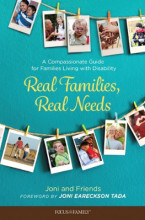
This resource is a compassionate guide for family members impacted a disability in the family, offering biblical truth, practical ideas, and hope.

Visit our online store and purchase a CD of today's program for yourself or to share with a friend.
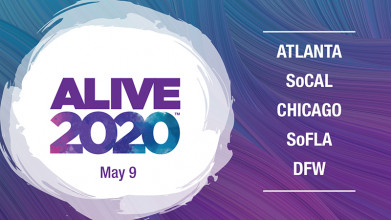
Focus on the Family is proud to announce ALIVE 2020 – a nationwide pro-life celebration on May 9, 2020 – the day before Mother’s Day! We’ll be “Alive” from Southern California, Dallas, Chicago, Atlanta and South Florida.

Be a voice for the pre-born and the sanctity of all human life. Add your signature to the Declaration for Life now.
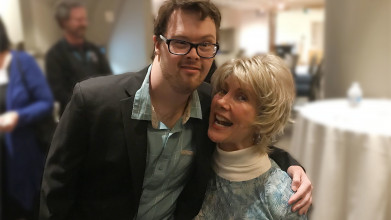
When I look at the photos of Joni Eareckson Tada and Trevor together, I can't help but think about how both of them, in their own unique ways, joyfully proclaim God's message that every human being is incredibly precious, infinitely valuable and eternally significant.
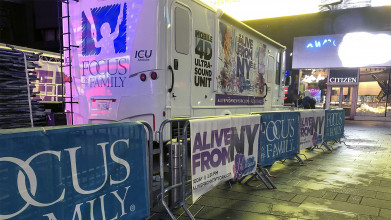
As we look forward to even more "Alive" pro-life events in 2020, I can't help but recall the powerful moments that took place in 2019.
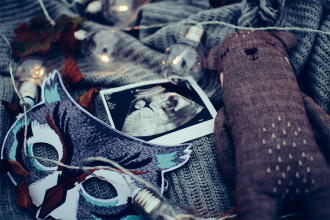
Disregard for human life breaks one of the Ten Commandments, "Thou shalt not kill." But God gave orders against taking human life long before Moses hewed out those Ten Commandments on the stone tablets.
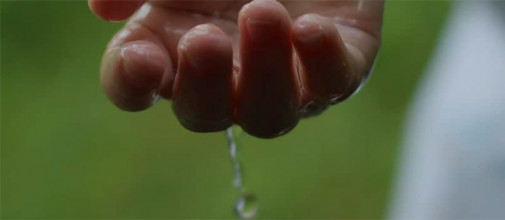
Find Focus on the Family broadcasts, best-in-class books, referral recommendations, and more.
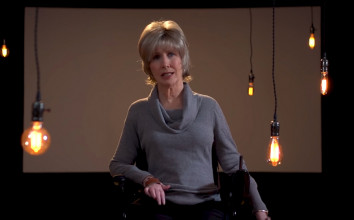
Wondering what Joni and Friends is all about? Watch as Joni Eareckson Tada shares about her journey through devastating hardships as she learned to rely on God.
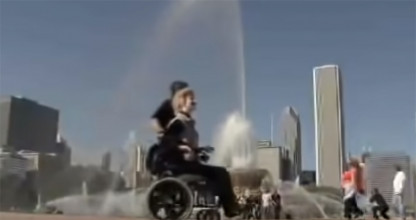
Visit YouTube to watch a documentary about Joni Eareckson Tada's life and ministry.

In this Adventures in Odyssey drama, a carelessly uttered word from Eugene creates havoc as it becomes the fashionable insult, resulting in a lesson about the power of words.

This discussion offers a preview of Volume #16 “Cultures in Conflict” from the That The World May Know video series, available below.

Debra Fileta will help couples better understand the four seasons of healthy relationships, what to expect during each one, and how to carefully navigate them for a stronger marriage. (Part 1 of 2)

Larnelle Harris shares stories about how God redeemed the dysfunctional past of his parents, the many African-American teachers who sacrificed their time and energy to give young men like himself a better future, and how his faithfulness to godly principles gave him greater opportunities and career success than anything else.

Our guests share their dramatic stories of surviving the attempts to end their lives while in their mother’s womb, providing a stark and undeniable counter argument to pro-abortionists who argue that a fetus is not a living human being. (Part 1 of 2)

Our guests share their dramatic stories of surviving the attempts to end their lives while in their mother’s womb, providing a stark and undeniable counter argument to pro-abortionists who argue that a fetus is not a living human being. (Part 2 of 2)